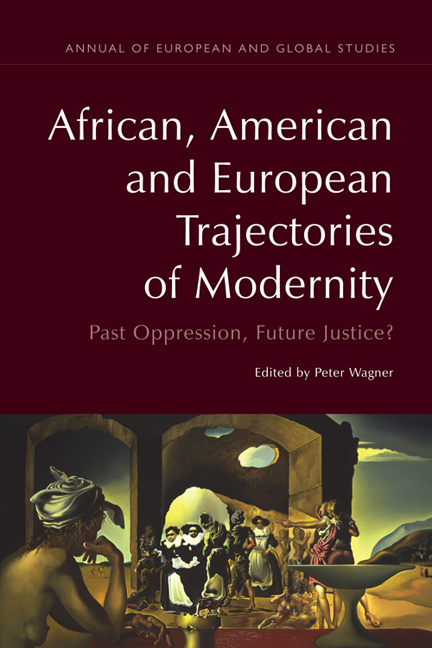Book contents
- Frontmatter
- Contents
- List of Figures
- Introduction
- Part I Reconstructing the History of Atlantic Modernity
- 1 The American Divergence, the Modern Western World and the Paradigmatisation of History
- 2 The Limits of Recognition: History, Otherness and Autonomy
- 3 On Being in Time: Modern African Elites and the Historical Challenge to Claims for Alternative and Multiple Modernities
- 4 The Sublime Dignity of the Dictator: Republicanism and the Return of Dictatorship in Political Modernity
- 5 The Luso-Brazilian Enlightenment: Between Reform and Revolution
- Part II Comparing Trajectories of Modernity in the South
- Part III Claims for Justice in the History of Modernity and in its Present
- Notes on the Contributors
- Index
3 - On Being in Time: Modern African Elites and the Historical Challenge to Claims for Alternative and Multiple Modernities
from Part I - Reconstructing the History of Atlantic Modernity
Published online by Cambridge University Press: 05 August 2016
- Frontmatter
- Contents
- List of Figures
- Introduction
- Part I Reconstructing the History of Atlantic Modernity
- 1 The American Divergence, the Modern Western World and the Paradigmatisation of History
- 2 The Limits of Recognition: History, Otherness and Autonomy
- 3 On Being in Time: Modern African Elites and the Historical Challenge to Claims for Alternative and Multiple Modernities
- 4 The Sublime Dignity of the Dictator: Republicanism and the Return of Dictatorship in Political Modernity
- 5 The Luso-Brazilian Enlightenment: Between Reform and Revolution
- Part II Comparing Trajectories of Modernity in the South
- Part III Claims for Justice in the History of Modernity and in its Present
- Notes on the Contributors
- Index
Summary
TO BE MODERN, says C. A. Bayly (2004), is to be ‘up with the times’. It is, according to Peter Wagner (2012), ‘to be in one's own time’. This chapter uses these two claims, drawn from the disciplines of history and sociology respectively, to speculate about how scholars might use the idea of temporality– privileged by both Bayly and Wagner as being central to a subject's experience of modernity– to engage critically in debates about what some thinkers have called ‘multiple modernities’ and ‘alternative modernities’. Drawing on the colonial archive in South Africa, this chapter looks at how scholars might enrich ongoing debates about multiple and alternative modernities and, in the process, deepen our understanding of modernity. The notion of ‘multiple modernities’ is associated with Shmuel Eisenstadt, while Dilip Gaonkar pioneered the concept of ‘alternative modernities’. According to Eisenstadt (2000), the notion of ‘multiple modernities’ offers a view of the contemporary world that breaks with modernisation theories that were, for the better part of the twentieth century, dominant in the social sciences. Eisenstadt (2000: 2) says: ‘The idea of multiple modernities presumes that the best way to understand the contemporary world– indeed to explain the history of modernity– is to see it as a story of continual constitution and reconstitution of a multiplicity of cultural programs.’ For his part, Gaonkar (1999: 1) says: ‘To think in terms of alternative modernities is to recognize the need to revise the distinction between societal modernisation and cultural modernity.’
Without getting into the merits and potential demerits of the distinctions between society and culture drawn by both Eisenstadt and Gaonkar, this chapter argues that there is great intellectual profit to be had from taking seriously Bayly's and Wagner's claims about temporality as a key dimension of the modern experience, as well as Eisenstadt's and Gaonkar's argument for complexity. This chapter draws on a specific historical case, involving a group of Christianised African elites in colonial South Africa from the late nineteenth century to the early twentieth century, to show how scholars might go about finding archival support for the kinds of claims advanced by Bayly, Wagner, Eisenstadt and Gaonkar. By looking at these early African elites and their engagement with aspects of the colonial order, we can see the ways in which temporality was, indeed, a crucial dimension of what it meant to be modern.
- Type
- Chapter
- Information
- African, American and European Trajectories of ModernityPast Oppression, Future Justice?, pp. 64 - 76Publisher: Edinburgh University PressPrint publication year: 2015



